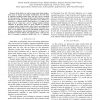Free Online Productivity Tools
i2Speak
i2Symbol
i2OCR
iTex2Img
iWeb2Print
iWeb2Shot
i2Type
iPdf2Split
iPdf2Merge
i2Bopomofo
i2Arabic
i2Style
i2Image
i2PDF
iLatex2Rtf
Sci2ools
125
click to vote
GLOBECOM
2008
IEEE
2008
IEEE
Blooming Trees for Minimal Perfect Hashing
Abstract—Hash tables are used in many networking applications, such as lookup and packet classification. But the issue of collisions resolution makes their use slow and not suitable for fast operations. Therefore, perfect hash functions have been introduced to make the hashing mechanism more efficient. In particular, a minimal perfect hash function is a function that maps a set of n keys into a set of n integer numbers without collisions. In literature, there are many schemes to construct a minimal perfect hash function, either based on mathematical properties of polynomials or on graph theory. This paper proposes a new scheme which shows remarkable results in terms of space consumption and processing speed. It is based on an alternative to Bloom Filters and requires about 4 bits per key and 12.8 seconds to construct a MPHF with 3.8 × 109 elements.
Collisions Resolution | Communications | GLOBECOM 2008 | Minimal Perfect Hash | Perfect Hash Function |
| Added | 09 Nov 2010 |
| Updated | 09 Nov 2010 |
| Type | Conference |
| Year | 2008 |
| Where | GLOBECOM |
| Authors | Gianni Antichi, Domenico Ficara, Stefano Giordano, Gregorio Procissi, Fabio Vitucci |
Comments (0)

